#so... this is what people mean when they talk about how catra is deeply relatable to fans of she-ra
Explore tagged Tumblr posts
Text
i think once i move accounts, i’ll be more open about liking she-ra on my all-fandom sideblog instead of just creating a separate one for it.
it shouldn’t be a controversial statement to say that i’m critical of all the show’s writing flaws, and even catra herself, just because the story is so dear to me and catra is so beloved. i literally kin because of her, there has never been a character that has been truly representative of me until i found her. understanding that she isn’t always good or likeable doesn’t change that. in fact, it strengthens my understanding of both her and myself.
#this is almost a fancy way of saying#sometimes i get why people have logical reasons to hate catra#i guess in a way it's therefore a form of self-hatred...? because i get why people have real reasons to hate *me*#and that sounds bad but i honestly believe that making this comparison has *helped* me more than if i didn't#it gives me a way to explore myself positively and start to cope with my own social issues#it allows me to analyze my shortcomings instead of deny them and not even try to work on them#it implies there is a sense of hope for my future and that i deserve a happy or even neutral ending#so... this is what people mean when they talk about how catra is deeply relatable to fans of she-ra#spop#she-ra#she ra#spop catra#catra#catra kin
5 notes
·
View notes
Text
idk if i posted about this but yeah, this is me bringing up the mcu again. but it's the guardians of the g/alaxy, or more specifically rocket (the raccoon).
i would say rocket is like catra but done right. rocket starts out as an asshole that laughs at others' misery or weaknesses. he wasn't a good friend to groot, though idk if that would count as abuse, because it's not like rocket sadistically hurt groot the way catra hurt adora (but you can disagree if you've watched the movies, it's been a while since i saw them). but as the first film goes on, rocket starts caring about the team and he's very distraught when groot sacrifices himself (for reasons we'll see soon). rocket becomes a sort of parental figure to baby groot following this.
in the second movie, rocket is still a dick, but we see more behind his motivations, and he clearly regrets being such an asshole. even if he doesn't explicitly apologize to quill at the end, rocket is very remorseful during the funeral of yondu, and he implies his apology (talking about yondu but in the end applying it to himself), and quill understands. in fact, rocket was the one who arranged the entire ceremony, which shows that he cares despite his sarcastic and mean personality.
and then the third movie actually deeply details rocket's backstory. he was a raccoon taken from earth and experimented on since he was a baby. he was raised by the high evolutionary, who praised him, but still abused him and scared him. rocket could be some sort of "golden child" since the high evolutionary was obsessed with his intelligence, and he couldn't care less about rocket's friends, other animals who were also experimented on. rocket eventually tries to break everyone free, but the high evolutionary (and the other guards) kills his friends. rocket breaks free all on his own. he also claws his abuser's face.
and all that explains why rocket is so afraid of getting close to ppl, or of being vulnerable. he lost his loved ones bc of that. he was mocked for mourning his dead friend. rocket's behavior is explained by these events, but they're not excused. and later he finds a family that accepts those feelings. when he mourns groot in the first film, drax silently relates to him and comforts him (drax also lost his wife and his daughter).
rocket actually grows as a character. in the end, not only does he accept who he is, he becomes the leader of a new group of heroes once the guardians disband in the third movie.
i also like that we see how rocket cared about his first friends, who welcomed him. they had a special bond. the movie SHOWS us that. they liked to dance and to daydream how the world outside the cages would be like. while i watched the third film, it reminded me of how catra and adora could've bonded with the horde trio.
obviously, again, spop is a whole other kind of media, while the gotg trilogy is aimed at older audiences (if a kid watched the third movie, though... they would be traumatized). but still, rocket reminds me a lot of catra, and what she could've been. an asshole but not an abuser. a criminal (i think he was a bounty hunter in the first movie) but not someone who massively kills people. it's not like he ever committed genocide/omnicide.
("ooooh but you hate flawed women and you just like rocket bc he's a man" literally i love gamora and nebula. those two are my favorite characters in gotg, besides rocket and groot. in fact they have a sisterly bond quite similar to adora and catra's, but that's another post)
#i post#spop critical#death mention tw#abuse tw#my favorite trilogy. probably the best trilogy in the mcu ngl#full of flawed characters who were abused or who lost ppl important to them#*chef's kiss*#literally what found family should be about
9 notes
·
View notes
Photo
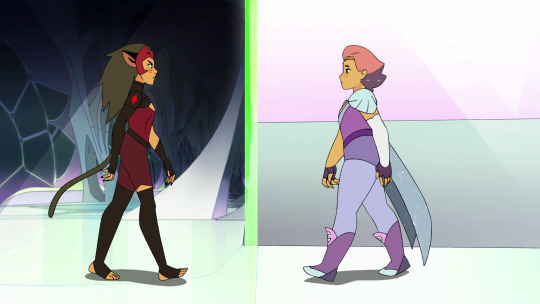
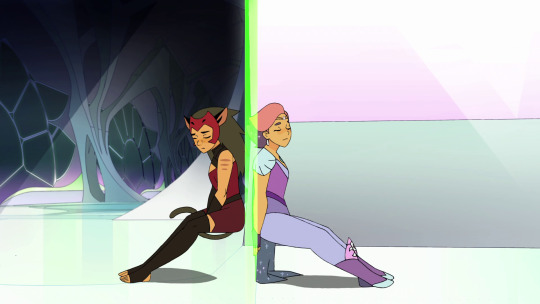
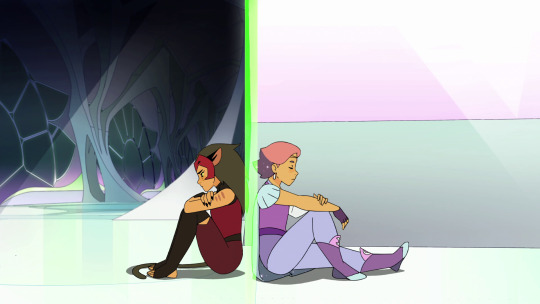
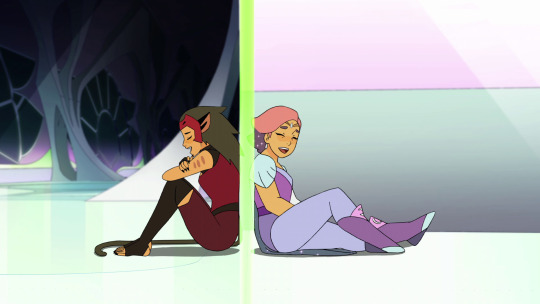
The parallels between Catra and Glimmer keep sticking in my mind. They don't quite mirror each other exactly, visually or thematically, but there's a lot of overlap. They're similar in so many ways, but the inverse of each other in certain ways as well. Their natures are so alike that if their circumstances had been swapped, they'd probably just become each other.
So, I guess I’m picking up my shovel and digging into this. I wanna examine the ways they’re alike, the key ways they differ, what shapes each of them, and why their intersecting journeys are significant. There’s a lot to unpack and this is gonna be a long post, but if the subject matter sounds interesting to you, then read on.
Their parallels are most evident in Season 4, but are also woven throughout the show. I'm thinking back to 1x07 when Adora explains to Bow and Glimmer what being raised by Shadow Weaver was like and Glimmer, without missing a beat, says: "Okay, sure, Mom stuff." Completely nonchalant, with a casual shrug, as if nothing sounded out of place. All of these characters are impacted by being embattled in a militaristic conflict, of course, but Catra and Glimmer are both getting particular parental experiences from their mother-figures, the only parent in either of their lives. Notably, they don't have the same experience. Angella's a much better mother to Glimmer than Shadow Weaver is to Catra. Shadow Weaver is abusive, manipulative, power-hungry, and especially cruel to Catra above all others. Even when Angella is harsh, she's constructive and supportive.
But both of these children end up with a strong desire to prove themselves on the battlefield. Both want their mothers to be proud of them, to recognize them as worthy. Catra spends the early part of her life suppressing the urge to prove herself, pretending not to care about it while secretly being deeply upset when she finds herself overshadowed by Adora. Glimmer, on the other hand, openly thirsts for opportunities to be a great commander and earn recognition for her accomplishments. They both have somewhat of an inferiority complex as well. Catra comes to decide she doesn't want to be the sidekick. Glimmer is insecure about being the princess who has to recharge.
In 1x08, Glimmer's jealousy toward Bow and Perfuma is essentially a microcosm of a key dimension of Catra's arc for the show. But Glimmer is much quicker to learn the lessons and grow. Due to her experiences, Catra's walls are much harder to break down. I'll swing back around to that point later.
As Season 1 draws to its close, Glimmer and Catra both gain a little more independence, though they do it in very different ways. Catra does what Glimmer wanted to do at the beginning of Season 1. She presents valuable tech and a valuable ally to her commanding officer. Glimmer gets closer to her mother and they both start to understand each other better. Catra defeats her mother-figure in combat. Glimmer and Catra both gain favor in their respective armies and get the much-desired chance to prove themselves in the Battle of Bright Moon.
In 2x02, Glimmer and Bow take Catra hostage and the ways in which these two characters differ are really highlighted. Glimmer is tempted more than once to be as ruthless with Catra as Catra would be with her, but Bow talks her down when push comes to shove. "We're not them." Catra doesn't have a person in her life who talks her down. Not anymore. Catra sees the reliance on friendship among the Rebellion as a weakness. "It's why you're never going to win."
With the environment she grew up in, Catra's understanding of concepts like friendship and love are primarily in relation to power and manipulation. She's quick to seize upon the closeness between Glimmer and Bow as a way to force Glimmer to use up her magic. Catra's own love for Adora is, in the early days, selfish. She doesn't want to share Adora, whether with friends in the Horde or friends in the Rebellion. And it's why she believes that Adora doesn't feel the same way. If Adora wouldn’t take things to the same selfish extremes, then she must not feel what Catra’s feeling. This is what Catra believes because her experiences have given her this very specific, and flawed, understanding of love.
Glimmer's relationship to love is different. She comes from a more supportive environment and even in the rare instance when she does trend toward selfish love, she's more able to accept and understand the flaws of it.
But focusing on 2x02: Glimmer and Catra push each other's buttons. Each of them instinctively knows how to hurt the other one, though Catra is more willing to inflict that hurt. They’re both paying attention and learning each other’s vulnerabilities. The one moment where Glimmer touches a nerve with Catra is: "How did Adora take years of this? She didn't run away from the Horde. She ran away from you." And Catra immediately pushes back: "You think she's not going to leave you behind too, Sparkles?"
It's somewhat telling that Catra sees Glimmer as having taken her place in Adora's life. Again, similar, but not the same. The relationship between Adora and Glimmer is different to the relationship between Adora and Catra, but Catra, with her limited and warped understanding of love, can't tell the difference anymore than she could when Adora first befriended Lonnie. Catra sees Glimmer as having the same place in Adora's life that Catra used to have. And as much as Catra wants, at this point, to tell herself she's over Adora, she's still angry.
So we’re kind of flipping between parallels and inversions, but a key factor starts to become clear at this point. What Catra and Glimmer hate in each other is what they fear in themselves. Glimmer hates that Catra took her as a hostage, but she's also frustrated that she can't be just as cruel when she has Catra as a hostage. She wants to be cruel, and yet she hates herself for wanting it. Catra hates seeing Glimmer step into the role of Adora's sidekick and she mocks the Rebellion for "the power of friendship" because she hates how vulnerable she felt after opening her heart to Adora. She wants a loving relationship, and yet she hates herself for wanting it. Catra and Glimmer see their own perceived flaws, weaknesses, and shortcomings in each other, which is why there's so much friction between them. It's really an interesting concept that develops further as the show goes on.
The next minor point of interest is 2x04. Glimmer sees the primary conflict as being between herself and Catra. It’s not much, just a little look into how Glimmer is thinking about things.
Seasons 2 and 3 are paired together in terms of themes in a way that other seasons aren’t. At the end of Season 2, or midway through the story threads, Catra loses her mother-figure. At the end of Season 3, Glimmer loses her mother. Once again, the circumstances differ. Angella is truly gone, but Shadow Weaver has simply switched sides. Glimmer’s arc going forward is very much driven by Angella’s absence, whereas Catra’s arc is driven by Shadow Weaver’s presence...as an enemy combatant.
And Shadow Weaver doesn’t just join the Rebellion, she starts working her way into Glimmer’s life. Her opening pitch that gets Glimmer to free her plays on a familial connection - the fact that she taught Glimmer’s father. They go to the Fright Zone together and of course they run into Catra, who discovers Shadow Weaver quite literally taking Glimmer by the hand.
All of this sets the stage for Season 4, where the Catra and Glimmer parallels are at their strongest. The two of them become much more similar to each other in this season. Glimmer is now receiving guidance and familial connection from the very person who shaped Catra into the person she is.
Both Catra and Glimmer effectively take control of their respective armies. Glimmer literally becomes queen and, in the very same episode, Catra seats herself on Hordak’s throne. Glimmer is reluctant to take the throne, Catra is eager to. At the end of the episode Catra says to Hordak, “I think you and I are going to do great things together.” This line echoes what Shadow Weaver said to young Micah and baby Adora. And of course Glimmer is also stepping into her mother’s role.
From there, the two of them find themselves on similar paths. In 4x02 they both have the same idea to recover Mara’s ship. In 4x04 Glimmer wants to think like Catra and asks Shadow Weaver to teach her. Glimmer ends up in a fight with Catra and Catra marvels at Glimmer’s tactical decision to use Adora as a decoy. Where Glimmer was previously unwilling to be like Catra, now she’s determined to do anything for victory. And of course the idea to use Adora as a distraction came from Shadow Weaver and Catra’s recognizing this change in Glimmer’s tactics without quite realizing why it should feel familiar.
Some things happen at different times for these two, but there’s so much overlap. Glimmer starts the season dealing with boring meetings and itching to be out in the field, jealous of her friends. For Catra, she starts the season in the field, but as her plans advance she finds herself stuck in the Fright Zone while Hordak does the field work.
Both of them are focused on success, no matter the cost. They both become so stubbornly obsessed with winning the war that it fractures their friendships. They reject all counsel and push away the people who care for them. In spite of being hurt by losing the trust of their friends, they both double down on trying to win, expecting total victory to be the thing that brings them peace of mind, the thing that makes everything worth the cost.
There’s a push and pull between the two of them throughout the season. Neither can succeed in their chosen path without destroying the other. And yet they can’t seem to destroy each other without losing themselves. Metaphorically, destroying each other would mean destroying their own shortcomings, and both of them want those weaknesses and doubts erased, but neither of them can manage to strike the final blow.
Catra gains the upper hand in the war by having Double Trouble work the cracks in Glimmer’s friendships. Glimmer gains the upper hand by having Double Trouble drive a decisive wedge between Catra and Hordak. Double Trouble’s duplicitous allegiances and feigning of friendships are key developments on both sides of the battlefield and their services are weaponized by both Catra and Glimmer to target each other. Double Trouble essentially acts as a messenger, sent from both of these two characters to tear the other one down. Catra and Glimmer personify to each other what they fear in themselves and Double Trouble gives voice to the doubts of both characters, acting on behalf of each of them in turn.
Double Trouble gets to Glimmer by suggesting that Adora is undermining the queen’s authority. They work from an understanding of Glimmer’s genuine desire to be a great queen. However, and this is a key point, when Double Trouble confronts Catra, the tactic is completely flipped. “You try so hard to play the big bad villain, but your heart’s never been in it, has it?” They work from the understanding that Catra’s apparent desire to lead the Horde to victory is not genuine. As opposed to Glimmer, whose heart has always been in it; her heart’s so in it that she becomes blind to the risks of her plans.
Part of Double Trouble’s speech to Catra can apply to Glimmer’s insecurities as well. “They didn’t believe in you, didn’t trust you, didn’t need you, left you. But did you ever stop to think, maybe they’re not the problem? It’s you. You drive them away, Wildcat.” Obviously it applies to Catra, but it also describes what Glimmer has just been through with Bow and Adora. Glimmer and Catra have so many overlapping fears and this messenger sent by Glimmer to throw Catra off balance ends up making this statement that labels Glimmer’s recent mistakes just as accurately as it does Catra’s.
The key difference between the two of them comes down to their hearts being in it. For all the similarities between Catra and Glimmer in Season 4, this climactic moment emphasizes that, for Catra, a lot of it is an affectation, a costume.
Which brings me to an element of the visual storytelling. I recently read an interesting post about the thematic significance of Catra’s mask. I also made my own post about the change to her hair in Season 4. The visual storytelling has many facets in this show. This post is about parallels though, so what I’m focusing on now is the fact that Catra and Glimmer both change their costumes in Season 4. The first scene of 4x01 features the reveal of Glimmer’s new look and the last scene of 4x01 features the reveal of Catra’s.
One of the first things I noticed about Catra’s outfit is that her new black sleeve and shoulder armor are covering the area that was damaged in the portal reality. At a guess, I’d say she wants to guard against feeling whatever that felt like again. Again though, my focus is on parallels. Let’s have a look at their outfits side by side.
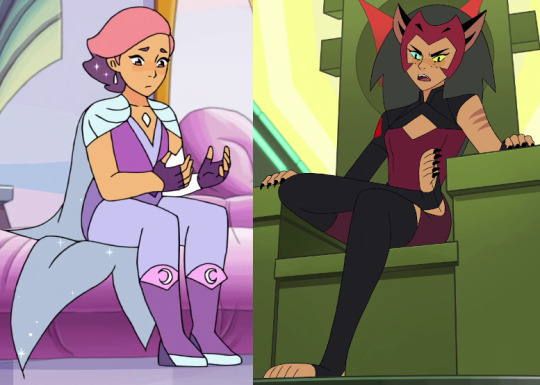
Glimmer’s is essentially an evolution. She’s growing more into herself. She now has both shoulders covered. Hard to say if these shoulder pads are decorative or could serve a protective function. They kind of look metallic. Her legs are newly covered; her neck and chest are newly exposed. There are a few changes to Glimmer’s outfit, but not a lot that’s truly new to her.
For Catra, there are a few new elements in her outfit. The single sleeve, the fingerless gloves, and at the shoulders she seems to have upgraded from fabric to something that looks more like it could be armor. Her legs are more covered than they were in her previous outfit, but there are still small exposed gaps. Her feet were never covered before, but now there’s a partial covering. And there’s also what fandom has dubbed the “boob window,” though this show isn’t one that gives focus to things like cleavage. The new elements for Catra bring her outfit a little bit closer to Glimmer’s.
I’ll be interpreting exposed skin as representing vulnerabilities. Of particular interest to me is the fact that they both wear single sleeves now, one white, one black, and they cover opposite arms. Glimmer has no mask on her face; Catra has no cape covering her back. Glimmer’s boots seem especially enforced at the heel and toe. Catra’s heels and toes are exposed. You know how I’ve been saying that they see their own shortcomings in each other? Now Catra is visibly vulnerable where Glimmer is guarded and vice-versa. The particular asymmetry of the sleeves brings to mind ideas of imbalance, both internally and between them.
Catra’s sleeve looks durable; Glimmer’s sleeve looks decorative. Glimmer’s sleeve leaves a gap of skin exposed below the shoulder pad; Catra’s sleeve covers the full length of her arm. On Glimmer’s unsleeved arm, the glove barely covers her hand; Catra’s glove covers a portion of her forearm. Remember 1x08, that point I said I’d come back to? Glimmer’s quicker to learn the lessons. Catra’s walls are harder to break down. Now it’s visually represented in their outfits.
I’ll reference the visuals as I go on, but let’s get back to thematic analysis. As the Season 4 finale draws to a close, Catra and Glimmer end up together and both have been brought low. Double Trouble has just seen through all of Catra’s walls and read her for absolute filth. Glimmer has to reckon with the fact that her own hubris nearly got everyone she’s been fighting for destroyed. Both have come closer to total victory and closer to total defeat than they’ve ever been. Coming off a string of mistakes and pushing away the people who care about them, they end up together.
Glimmer has the chance to attack a willingly defenseless Catra, but spares her. Moments later, Glimmer is threatened by Horde Prime, but Catra’s intervention saves her. It’s a layered action from Catra, certainly not altruistic, but it saves Glimmer nonetheless. I think something in each of them feels hesitant to see this person, in whom they see their own flaws reflected back at them, destroyed.
And now they’re stuck with each other, quite literally cut off from everyone else. They’re each wrestling with the weight of their own failures and shortcomings, so of course they’re both trapped with the metaphorical representation of everything they never wanted to face in themselves.
They’re together, and yet they’re separated. A barrier stands between them. Catra is at liberty to move about the ship, but there’s nowhere to go and no escaping the watchful gaze of Horde Prime. She’s frustrated by this illusory liberty: “If I’m a prisoner, you might as well make it official.” Glimmer, on the other hand, is in a cell and she wants out, even though there’s nowhere to go. For a brief moment, the barrier is taken down when Catra and Glimmer are invited to dine with Horde Prime. One very effective way to bring people together is to give them a common enemy. They’re only physically together when they’re united in defending themselves against him.
Horde Prime understands the similarities between the two of them and breaks through both of their walls at the same time with the same tactic. “You Etherians are all alike. Such strong connections to one another. It’s what makes you weak.” It’s the unguarded vulnerabilities in Glimmer that poke holes in Catra’s plan of “parsing out information like a bargaining chip.” Though Catra and Glimmer have a common enemy now, they’re not yet coordinated and working with each other.
So we return now to the scene from 5x03 at the top of this post. Even the way it’s framed is significant. The scene could presumably have been presented from the other side, but seeing it from this angle allows me to infer some things about what’s being communicated.
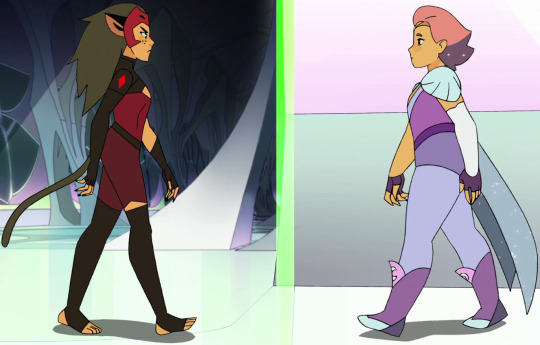
They start out facing each other and we see their sleeved arms. Neither is quite ready to trust the other, so their walls are up. When they stand face-to-face with what they fear in themselves, they put their guards up. They’re both more-or-less equally guarded and equally vulnerable, but the guarded side is what the show’s creators are showing the audience, as well as what Catra and Glimmer are showing to each other in this moment.
The scenery around the two of them shows a stark contrast. Glimmer’s cell is brightly lit with simple architecture. Much of the space around Catra is dark and complicated.
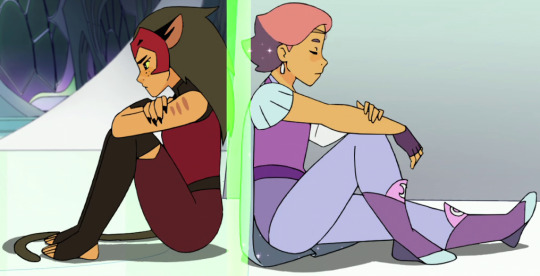
As they open up to each other emotionally, they turn back-to-back and we’re shown their unsleeved arms. When they look away from what they fear in themselves, they let their guards down. Both of them lay a hand on their unsleeved arms, almost as if they’re subconsciously worried that they might need their walls at any moment to defend these vulnerabilities.
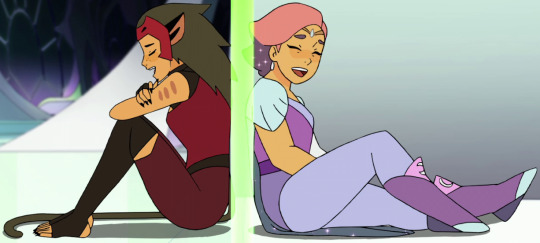
Their body language relaxes, though only fractionally in Catra’s case. Glimmer is a little more at ease, but Catra won’t let herself be quite as open and unguarded. Her fingers remain on that unsleeved arm, alert and ready to defend at a moment’s notice.
I’ve talked a bit about walls and defensiveness, but the way these two came to construct their walls is also important. Glimmer and Catra have both experienced hardships in their lives. Both of them grew up with only one close friend. They both felt pressure and a desire to prove themselves and they’ve both endured great tragedy in their young lives. Glimmer has developed more of the emotional tools to work through her pain and begin to heal. Catra is only at the beginning of the healing process and her pain comes from a very different source.
Glimmer spent the majority of her young life believing her father had been killed and then she lost her mother as well. Catra was either given up or orphaned and then taken in by an abusive family. Both experiences were surely traumatic. Catra’s walls are tougher for a reason though. A few reasons. The primary reason is that the source of her fear and pain was also her mother-figure.
Being traumatized by someone who should be on your side is different than other sources of trauma. And because Shadow Weaver is her parent, Catra also bonds with her and wants her approval. This is emotionally confusing and compounds Catra’s issues. Wanting love from Shadow Weaver is one of the reasons Catra hates herself for wanting love at all.
Not only is Catra traumatized by her parent, she also lacks any other parental guidance to help her process her trauma. Glimmer, even after losing her father, still had her mother. It’s after losing her mother that Glimmer really starts to lose balance emotionally. Though Catra had Adora, that kind of comfort is not the same as having the calming influence of a supportive parent to help a child cope with their trauma and assure the child that things will be okay. Further to that are the wedges that Shadow Weaver (and later Light Hope) employed to ensure that Catra and Adora would doubt each other. Then finally, Adora left the Horde and whatever comfort Catra had received from her turned poisonous. This was the thing that threw Catra’s sense of safety into chaos and unraveled any semblance of emotional balance. For much of the show, wanting love from Adora is one of the reasons Catra hates herself for wanting love at all.
This is all a roundabout way of explaining why Catra’s walls are so much thicker than Glimmer’s and why everything around her is dark and complicated. Glimmer has her own walls and coping mechanisms, but they’re constructed differently. Catra is largely driven by defensive panic responses. Glimmer is reactive and even reckless at times, especially after losing Angella, but she’s generally more able to slow down and sort through her feelings. Glimmer’s walls are constructed in such a way that they don’t impede her ability to grow and heal. Glimmer’s walls don’t keep as many things away, but her capacity to let the right people in is the trait that serves her best. The contrast between these two characters speaks volumes.
Season 5 is where Catra and Glimmer begin to learn from each other. They get past the initial reaction of simply being disgusted by seeing what they fear in themselves. They both make some appeals to each other for information and help. The barrier between them comes down again and Catra enters Glimmer’s space.
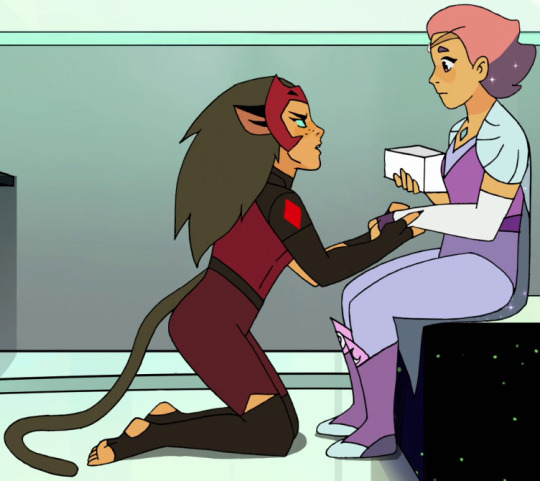
The audience is shown both sleeved arms. Walls are up. Catra uses both hands and takes Glimmer by the sleeved arm. The cake is in her unsleeved hand; it was an appeal to her vulnerable side. The full appeal from Catra that acknowledges Glimmer’s walls is the one that actually reaches her and gets Catra the information she wanted. It’s an appeal so strong that it can reach Glimmer through her walls, not just some simple ploy to prey on her softer side.
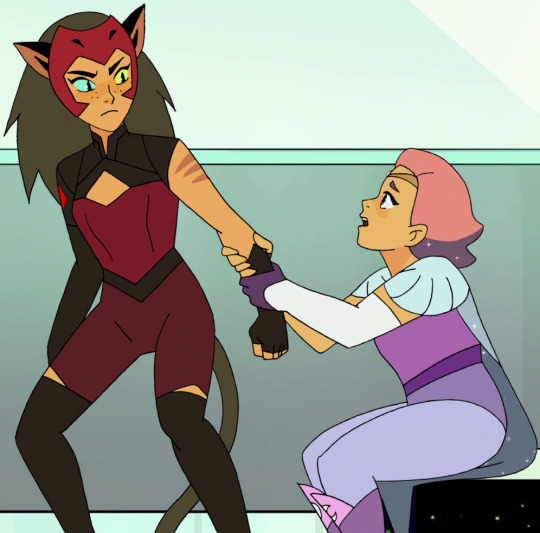
“You can’t tell him.” Glimmer uses both hands and takes Catra by the unsleeved arm. This is an appeal to Catra’s vulnerable side. And it echoes something that has previously frustrated Catra. “It’s always the same with you, Adora. I have to do this. Oh-oh, we have to do that.” This appeal to her softer side isn’t enough.
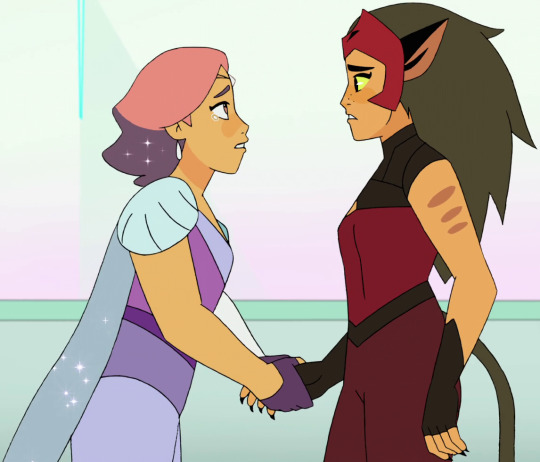
“Do one good thing in your life.” Glimmer uses both hands and takes Catra by the sleeved arm. The audience is shown both of their unsleeved arms. They’re both vulnerable here. It’s this appeal, which acknowledges Catra’s walls, that reaches her. Catra still reacts in fear, a response pattern that runs deep with her, but the message reaches her through her walls.
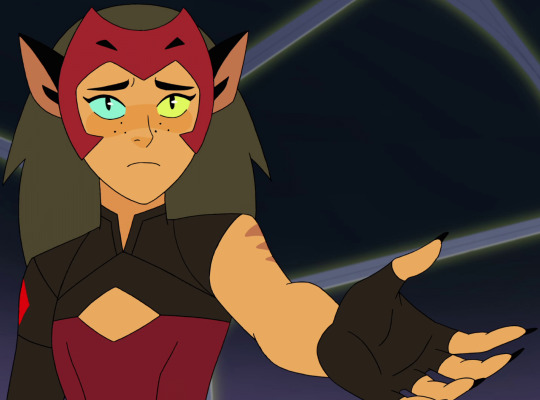
After processing some of her emotions, Catra returns, offering Glimmer her unsleeved arm. This is a vulnerable action from Catra.
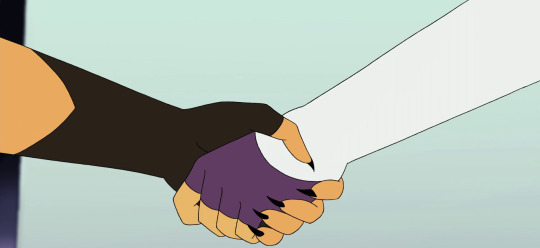
Glimmer takes Catra’s hand with her sleeved arm.
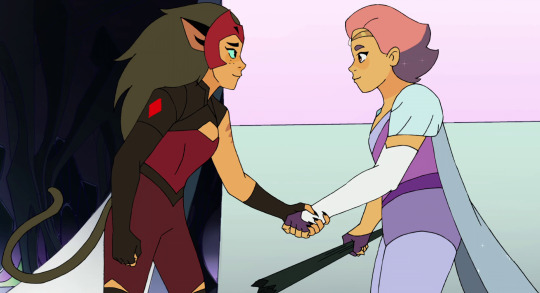
This is the turning point. They represent each other’s insecurities, each vulnerable where the other defends. Glimmer has the tools to balance out Catra’s vulnerabilities. Glimmer’s sleeved arm meeting Catra’s unsleeved arm is like saying: “I’ve got your back.” If they’re confrontational to each other, or if they ignore each other, they’re both equally defended and equally vulnerable. But if they stand side by side...
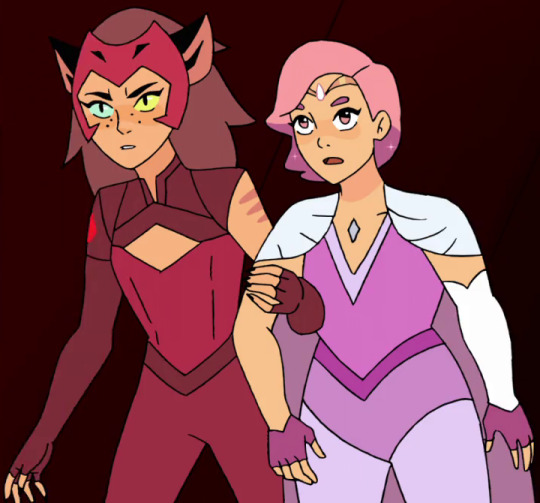
...they can compensate for each other’s vulnerabilities. They embrace and understand the insecurities they were afraid of and together they have the tools to present a balanced front that can protect them both. Neither one of them was going to be able to succeed alone, but together they can accomplish more.
Catra knew where the teleporter was and could have escaped on her own, but that would not be success. As Glimmer pointed out, even if Catra runs away it won’t matter when Horde Prime destroys the universe. As Catra pointed out, Adora would still come to rescue Glimmer. It’s their combined knowledge that leads to the solution.
Getting Glimmer out is the key, but Glimmer is unable to do this alone. Catra has the knowledge of the teleporter, Catra has the knowledge as well as the physical combat skills necessary to overpower the clones, and Catra has to be the one to take down the barrier that divides the two of them. Only Catra is in a position to achieve this. In terms of emotional metaphors, Glimmer is ready to let Catra in, but that fact alone isn’t enough. Catra has to be willing as well.
And the plan succeeds. It’s Catra’s most vulnerable action yet and she stands willing to sacrifice herself. Catra sends Glimmer, this metaphorical representation of her own insecurities, to Adora. This action is the very thing that ultimately saves Catra. She’s stuck with Horde Prime and her defenses are all ripped away, but it’s this show of vulnerability that affords Adora and company the opportunity to come in prepared and save this defenseless cat. Glimmer’s willingness to forgive Catra is significant for a lot of reasons, not the least of which is that Catra is the party most responsible for the conditions that led to Angella’s sacrifice, and Glimmer cites Catra sacrificing herself on Horde Prime’s ship as the reason she’s willing to help Adora go back and save Catra.
And once she’s saved, when Catra next gets the liberty to determine her own outfit, as she treads a path of vulnerability and learning to follow her heart...
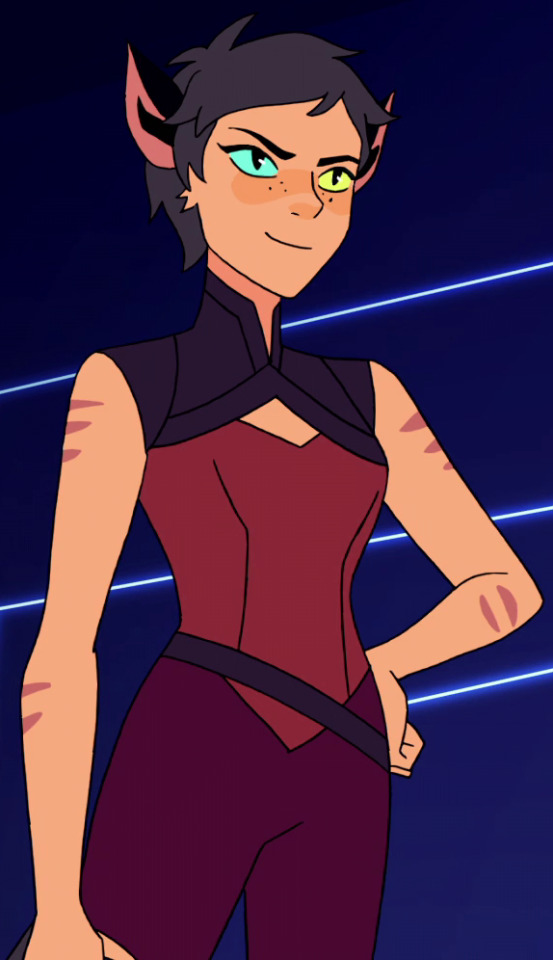
...the sleeve and fingerless gloves are gone. The costume she put on when she took her seat on Hordak’s throne has fallen away. That’s not who she wants to be anymore. Now she’s ready to start on the path of growing more into herself.
The push and pull contentious relationship between Catra and Glimmer has reached its conclusion, but there are still a few moments of interest. In 5x08, there are several instances where Catra questions what seem to be tactically unsound decisions from the Rebellion and they shrug off the concerns. Near the end of the episode, it’s Glimmer who questions the tactics and Catra who shrugs it off. This shows that they’re both getting more comfortable with each other and also both getting more comfortable with the parts in themselves that make them similar to each other.
In 5x10, when Catra finds herself in trouble, trapped and confronted with rising water, she calls Glimmer, knowing now that Glimmer is someone she can trust when she comes up against the limits of her own vulnerabilities.
In 5x12, Catra goes to Bow and Glimmer, looking for Adora. Glimmer informs Catra that Adora left them behind. Catra says: “Of course she’s gone. That’s what she does, isn’t it?” Glimmer was caught off guard by this, but Catra has recognized this vulnerability in Glimmer since Season 2. “You think she’s not going to leave you behind too, Sparkles.” This time Catra’s not just here criticize; she’s here to help. She warns Bow and Glimmer about Horde Prime’s plans and volunteers herself to take over helping Adora. Glimmer comes up against the limit of her vulnerabilities, but she can tag in Catra to help her now.
In the literal sense, this shows the value of letting other people in. In the metaphorical sense, it shows the value of accepting oneself. Learning from others, finding the common ground, gives us a fuller understanding than we can achieve on our own. No one can do everything alone, but working with people who are skilled where we come up short, guarded where we are vulnerable, and open where we are closed off is what unlocks the potential to accomplish things that would have otherwise been impossible.
I love that message, but I also love the metaphorical message. Glimmer and Catra have repeatedly seen in each other the things they were afraid of in themselves. Hating each other is tantamount to hating themselves and their acceptance of each other is tantamount to accepting themselves, which makes both of them more well-rounded and helps them to move forward.
And those lessons, to me, are among the most significant things about their intersecting journeys. They accept the differences in each other, they recognize the similarities in each other, and they come together to build each other up. It’s at once a journey of learning to accept others and a journey of learning to accept themselves. They learn that greeting their shortcomings with anger is ultimately self-destructive, ignoring these vulnerabilities is perilous, and it’s only through acceptance that they can begin to understand themselves, compensate for their limitations, and better themselves.
They each look into a mirror, see their own insecurities staring back at them, then decide to give that person a hug and say: “I’ve got your back.”
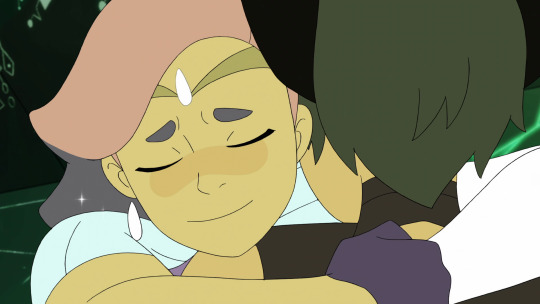
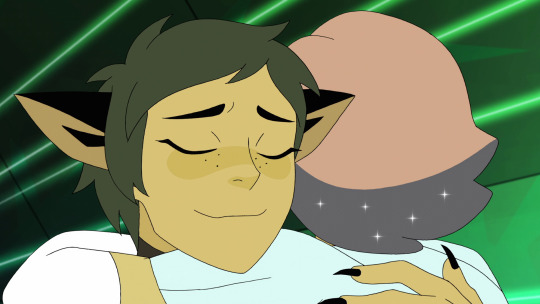
81 notes
·
View notes
Text
Settings in She-Ra
Today I will talk about setting and how She-Ra uses its settings to do some very cool things with its writing. I didn’t even notice all of these things until a recent rewatch because it’s so subtle and yet so brilliant at unconsciously making you notice things. TL;DR: The two major characters, Adora and Catra, are reflected in the show by a few major settings. And in this essay I will -
To understand settings in She-Ra, you need to understand that writing is rarely a cause-and-effect endeavor. Writing decisions and choices don’t just happen because something is the most likely to happen in the world of the story; things happen because the author writes them. So when something takes place in the Whispering Woods, it’s important to remember that was a deliberate decision for some event to happen there, not just because it’s a logical outcome. Following this, I will make a guess that She-Ra’s major settings are like an extended metaphor for the thoughts and feelings of its two major characters, Adora and Catra.
What tipped me off to this was a recent rewatch, when Adora and Catra confront each other at the end of Season 3. And it occurred to me just how often they confronted each other in the Whispering Woods. Seems odd, right? Another thing is that Adora goes on her own Hero’s Journey. The Hero goes into the Unknown, a supernatural place, and encounters challenges, only to grow past them and emerge a changed person, and returns to their life. Adora definitely changes; she literally transforms into She-Ra for the rest of the series, and She-Ra even changes again when Adora gets a new transformation.The Whispering Woods can certainly be defined as the Unknown, in a literal sense; even the princesses and native Etherians treat it with caution and confusion, because it’s so ancient and mystical. The Woods also exist as a boundary between the Horde and Brightmoon, a middle ground. If Adora’s journey begins in the Horde and ends in Brightmoon, she has to go through the Woods, the Unknown, in order to complete it. Adora’s journey is centered around her inner thoughts and feelings as much, or even more, as it is about winning a war. And these challenges to her thoughts and feelings usually take place in the Whispering Woods, which is a metaphor for her sense of self. Or else, they take place in First One’s ruins, which are in the Woods, and represent Adora going deeper into her thoughts.
No post of mine is complete without numerous examples, so let’s take it from the top. Adora and Catra leave the Horde, their home, to enter the Woods, and Adora encounters something strange and new there. Adora goes back, and Catra stays behind, metaphorically because Catra isn’t ready to start her own journey yet. Glimmer and Bow enter the ruins with Adora, and she slowly learns to let them into her life and they become her close friends. Adora gets to Brightmoon but enters the Woods again when she is unsure of what to do, and gets advice from Razz. (Which is really advice from herself: “You’re a smart girl. What do you think?”) When Adora next encounters a problem she can’t handle, healing Glimmer, she retreats to the Woods again in search of answers. She goes deeper and finds Catra in the ruins in Promise. After making the major decision to essentially cut Catra out of her life, to “let go,” the Woods end up destroyed in the process of the Battle of Brightmoon, much like how Adora’s own thoughts are conflicted.
The next major conflict in the Woods happens in the Season 3 finale, in the false world created by the portal. Adora confronts Catra yet again, not just once but twice, and firmly makes a decision: I can’t be friends with you anymore if you keep acting like this. We also get a nice look at Adora’s theme of destiny and how that relates to Glimmer and Bow leaving her alone, and Angella sacrificing herself when Adora initially believes that’s her destiny.
Our next major glimpse of the Woods comes from Mara, actually! Mara herself goes on a little brief journey, and learns new things from Razz in Hero, in where else? The Woods. Mara, being the She-Ra before Adora, as a predecessor figure, emphasizes that the Woods have some mystical connection to the mystical She-Ra - and the exposition for the audience doesn’t hurt here either. Season 4 ends with another major conflict between Adora and one of her parental figures, Light Hope. We go as deep as we’ve been yet into the First Ones’ ruins, and it ends with Adora rejecting the concept of her destiny.
Finally, in Season 5, when Adora gets back to Etheria, she retreats from Prime to, where else, but the deepest part of the Whispering Woods. However, much like how Prime’s chips can take over a person’s thoughts, so too do the chipped people take over that camp, corrupting a safe haven for Adora. Shadow Weaver worms her way into the new camp in the Whispering Woods, and in the next episodes, Adora starts letting Shadow Weaver’s incorrect arguments about repressing her thoughts and feelings worm their way into her head. But then Adora goes as deep into the ruins as she’s ever been, the literal center of the planet. Glimmer and Bow turn back and trust Catra to go deeper, with Shadow Weaver. It’s in the tunnels where Adora rejects Shadow Weaver one last time, and Shadow Weaver dies, and Adora can start to get closure on that chapter in her life. And then Adora accepts her love for Catra. How cool is it that this place is called the Heart? Not just a heart, as in the center of Adora’s self, but a heart as in the symbol for feelings and wants. And how it’s both of those, suggesting that feelings and wants are the strongest and most central part of her mind and self. (If you’re familiar with my other ramblings, insert the “magic, especially She-Ra’s magic, is love” metaphor here.)
As an aside, the two parts of her mind, the First Ones and the natural Whispering Woods, can be read as an extension of this metaphor; she’s torn between two groups. While Adora is technically adopted, based on the themes of the show, this isn’t so much about literal feelings about adoption as it is “found family vs birth family.” So the First Ones don’t represent adoption in a negative light, as much as they represent some of our birth or immediate families. And how the family Adora found and chose, is so much better for her than the families that were chosen for her (either Light Hope as a representation of the First Ones, or Shadow Weaver as someone who takes her in).
Whew, ok. How about Catra? Catra’s self is reflected much like Adora’s. Catra’s major setting is the Fright Zone. She wins most of her major victories there. She defeats Shadow Weaver, and she defeats Hordak. But she also loses her friends. She stuns Entrapta. The two pivotal moments of Scorpia leaving her happen in the Horde: when she confirms she would destroy Emily, and Scorpia calls her a bad friend; and when she discovers the note Scorpia left behind. Double Trouble confronts her in the Fright Zone after she fights Hordak. Unlike Adora, the Fright Zone is portrayed as an unhealthy place.
Catra only starts her own journey when she enters her version of the Unknown. If Adora’s version is the Woods, then Catra’s supernatural place where she doesn’t feel at home is Horde Prime’s ship. She tries her games again, to make her way up the ranks, but it’s clear Prime isn’t falling for them. She confronts her inner thoughts and feelings: “Adora means something to you.” She sees what she’s always known deep down, in an irrefutable way: the Horde, and Prime, is super unhealthy. She makes her pivotal decision to change when she rescues Glimmer. And let’s talk about that, because there’s something super neat about Adora’s reflection of her deepest thoughts, the ruins, and Catra’s reflection of her deepest thoughts, the Velvet Glove. These are the only two places where there are diegetic flashbacks, and only for Catra and Adora. (Diegetic means “in the world of the story.” Characters can see or hear a diegetic thing. So background soundtracks are for the audience only, that is non-diegetic music; Sea Hawk’s shanties can be heard by the characters and the audience, that is diegetic music.) There is an explanation in the world for Adora’s: it’s tech, either by Light Hope, or a leftover. But there is absolutely no reason that Catra can see the exact same style of flashback aboard the Velvet Glove, in Corridors. Why only these two places, that just so happen to be the two places that reflect each of their deepest feelings? Speaking of Corridors, it’s an exceptional episode for all its imagery and it’s here that the setting reflects Catra the most. It’s here when Catra reaffirms her deepest fears. “All I do is hurt people. There’s no one left in the entire universe who cares about me.”
But she’s wrong! Because although Adora and Catra are each reflected in their settings, they are also deeply intertwined with each other. We see this in Save the Cat, when Adora goes into the Velvet Glove without even being able to turn into She-Ra, ready to make the worst tactical decision ever, of all time, to try and save Catra. We see this in Promise, when the two deeply confront each other about their innermost feelings, and the settings become intertwined: we’re in the ruins for Adora, and at the same time in a simulation of the Horde for Catra. We see this in the Woods in Season 3’s finale, when they confront each other yet again. We see this in the tunnels in Heart, Part 1 and Part 2, when Adora sees Catra in simulations and Catra makes her way into the deepest part of the Heart to save her. Think about the number of times they have been alone with just each other in any of these settings. Think about who gets to be in these settings with them, and how that usually or always reflects who has the most influence on these two as characters. (Remember Prime isn’t so much about who he is, as what kinds of thinking he represents.)
The settings in She-Ra not only reflect the two main characters visually, but also metaphorically. Adora is the Woods and the ruins. Catra is the Fright Zone and the Velvet Glove. The characters enter each other’s settings many times, and they argue and fight. But, throughout all that time, they’ve still held the other near to their heart. As Catra says to Adora: “I love you. I always have.”
48 notes
·
View notes
Text
A Meta on Catra’s Relationships with DT, Scorpia, and Adora
I’m so excited to write this finally ljsdflkj okay so. I’ve been thinking about why the creators would choose to center a whole season around this new character Double Trouble. They drove the plot and played a major role in a really important part of the story, Catra’s redemption. So I wanna think more about the purpose of this character and go deeper into a couple of their scenes with Catra.
tbh Catra and DT’s very first interaction says it all: DT literally takes the form of Scorpia and tells Catra “I’m about to become your new best friend.” As the season goes on, Double Trouble replaces Scorpia as a sort of artificial confidant for Catra. But it blows up in her face and the purpose of the whole thing is to shed light on Catra’s main internal conflict: her desire for love vs. her fear of heartbreak/vulnerability.
In other words, I believe Double Trouble was introduced as a foil to Scorpia. But if we think about how Scorpia is also a foil to Adora, then that means DT is like... a foil to a foil. So they’re not directly associated with Adora but a lot of what they do relates back to her. Yeah there are a lot of layers here lmao but basically what I’m gonna analyze is how Catra’s relationships with these three characters intertwine and build off each other in season 4 to set the stage for Catra’s redemption (and catradora endgame hollaaa)
So in the beginning, Catra and DT both understand their relationship to be a business arrangement. When does that start to change for Catra, and why?
Catra’s History With Betrayal
Just think about Catra’s relationships at the start of s4.. After the portal, Adora had basically severed whatever was left of their relationship, and that was shown to be weighing on Catra all season. Scorpia and Entrapta were the only other people she cared about, but Entrapta betrayed her (first by monopolizing Hordak’s attention then by refusing to open the portal), then Scorpia dared to question her decision to send their friend to die and her presence became a constant reminder of Catra’s guilt. In fact, the mere mention of Entrapta’s name in 4x03 causes Catra to snap and yell at Scorpia “we are not friends!” ... which of course isn’t true. Catra may think Scorpia’s annoying but she confided in her, her loyalty made Catra feel like she could trust her.. and that’s exactly why Catra always tried so hard to push her away. All the betrayals in her life scarred her so deeply that she wanted to avoid emotional intimacy at all costs. I’m about to get Jungian up in this shit bc we see a deep disconnect between Catra’s outward actions (her conscious) and her inner desires (subconscious) this season and it’s this i believe that leads to her breakdown in 4x10. It’s an unsustainable way to live.
Why Catra Trusted Double Trouble
So by 4x04, Catra had sabotaged her only two relationships. She was utterly alone, and vulnerable, and Double Trouble was in the right place at the right time offering their loyalty to her.. so Catra did what any emotionally stable person would do and subconsciously used a hired mercenary to try and fill the growing void in her heart. I don’t think Catra actually cared about DT much at all, like sure they got along and that matters on some level, but I think it’s more that Catra was in a vulnerable place and DT was the only one around.
So why does Catra trust Double Trouble when she won’t let herself trust anyone else? I’ve seen some posts saying it’s because Catra is self-destructive--i.e. she only seeks love from people who won’t give it to her because she doesn’t believe she deserves love--which is super true.. but I think her motivations can be better explained by saying that Catra knew from the start that Double Trouble didn’t really care about her, and that’s why the partnership was attractive to her (at first). She thought it would be safe--no vulnerability, no risk of heartbreak. But the truth is Catra’s just not as disaffected as she wishes she was.
The moment Catra really let her guard down was when Double Trouble saved her from the collapsing building in 4x04.
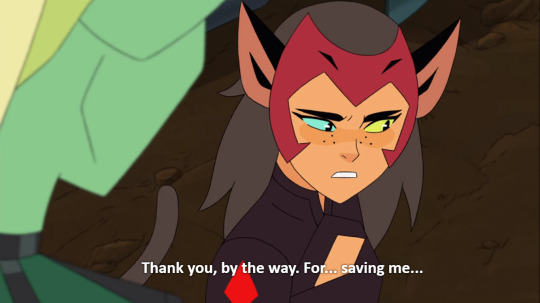
can we just!! talk about this scene!!!! the way her voice shakes when she says “saving me” just, oh my god... like what a touchy subject for her, right? Shes spent her whole life resenting how Adora was always trying to “save” her from everything. I’m not sure but I think White Out (2x05) was the only other time Catra thanked someone for saving her life, and she just says “thanks for getting us out of there.” So her use of the word “save” here is special and it illustrates how deeply vulnerable Catra feels this season, and more importantly it’s a sign of character development! It’s no coincidence that the theme of saving is connected between DT, Scorpia, and Adora. It’s leading up to Catra learning to replace her resentment towards Adora with something closer to gratitude.
But while the scene connects these relationships, it also highlights their differences. After Catra displays an astounding amount of vulnerability with DT, they coolly reply “well, I live to serve... for a price, of course.”
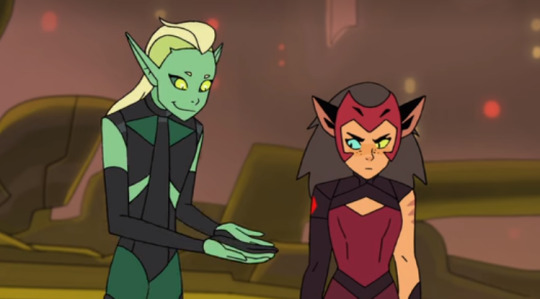
This right here is the first step of Catra’s breakdown. Suppressed desires making themselves known, one half of her heart rebelling against the other. She was pushing away her real friends and finding hollow companionship with someone she thought she wouldn’t get attached to, but it happened anyway.
The difference between Double Trouble and Scorpia must have become glaringly obvious to Catra in that moment. Whereas Scorpia was loyal to Catra out of love, DT was mostly interested in getting paid. And she was surprised by how much that hurt. She fucking hated how much it hurt, you can see it written all over her face. It’s why she fails Scorpia’s little test in 4x06. Because of Double Trouble, Catra’s true desires were threatening to break free, so outwardly she fights against it and acts more resistant than ever to being friends with Scorpia. She castigates her, calls her annoying and incompetent, harsher than we’ve ever seen... but she didn’t expect Scorpia to hit back (we did, tho. Scorpia’s an icon).
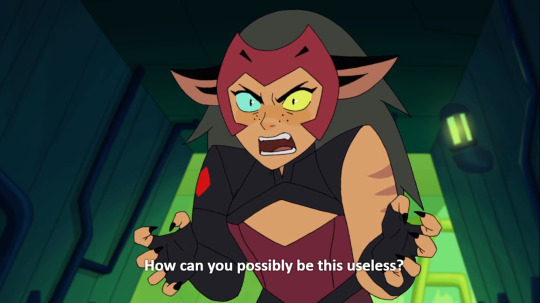
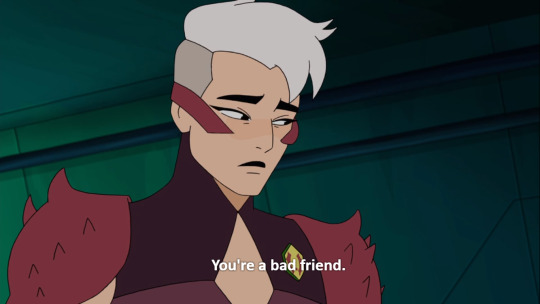
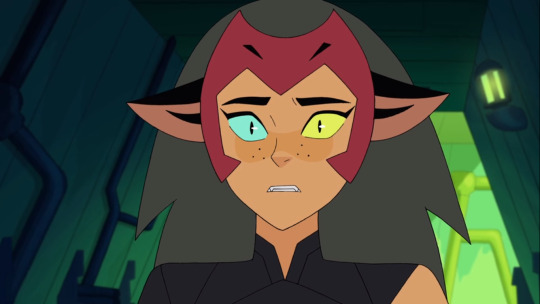
In four words Scorpia teaches Catra a hard lesson about what it means to earn someone’s loyalty. She knew she must’ve really fucked up if she somehow managed to push away the most loyal person in all of Etheria. And again the fake nature of Catra’s relationship with Double Trouble provides a reference for her to see why Scorpia’s loyalty, based in love, was so valuable, and why she shouldn’t have taken it for granted. It also relates to Adora because, similar to Scorpia, Adora had been trying so hard these past 3 seasons to connect with Catra, but she refused to forgive her and her behavior eventually forced Adora to cut ties. So Scorpia calling her out pushes Catra towards accepting some personal responsibility for everything that happened with Adora, too. Man there are just.. a ton of implications here.
Then Catra gives Hordak a fun pep talk but really it’s just her self-projecting all over him:
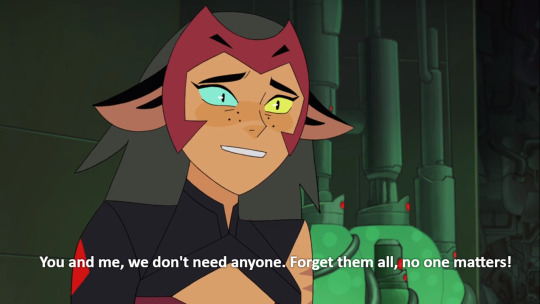
At this point her hateful actions and her goal to conquer Etheria are extremely out of line with her true desires and we can see it’s really affecting her mental state. It wasn’t just one thing or person that caused her breakdown, it was a combination of Adora severing their relationship, and Scorpia’s disappointment in her, and Double Trouble’s indifference towards her. All three of these situations were playing off each other and chipping away at Catra’s carefully crafted armor, revealing a desire to be loved hidden underneath... which she continued to fight against for as long as she could. Adora and Scorpia were playing their roles in helping Catra learn to take responsibility for her life, but those relationships wouldn’t have been so effective had it not been for how they were contrasted with Double Trouble’s indifference. Anyway have I mentioned how amazing and complex this show is????
Catra Loses DT and Scorpia Around the Same Time
4x07 is the last time Catra talks to Double Trouble before they get captured by the rebels. Coincidentally, Catra realizes that Scorpia left her just one episode later, which once again points to a connection between these two characters. From 4x08 to 4x11 Catra is completely alone, feeling like she has lost everyone in her life. It sets the stage for her meltdown in 4x10. But my fave part about Scorpia leaving is how it changes the way Catra thinks about betrayal.
Even if Scorpia didn’t tell Catra where she was going in the note she left, Catra had to have assumed she was leaving to join the Rebellion because where else would she have gone right? So the two people Catra loves most have now BOTH abandoned her to join the rebellion. I don’t even wanna think about how triggering that betrayal must have been for Catra.. I don’t wanna think about how the next time Catra sees Scorpia she’s going to be a full blown princess with powers and everything, just like what happened with Adora.
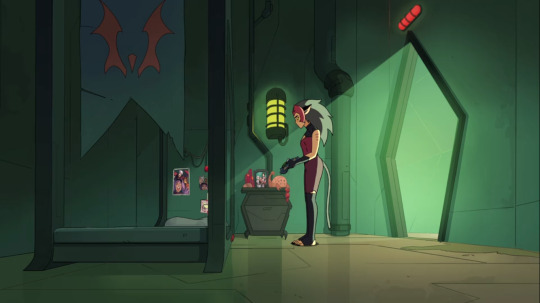
But there’s a key difference between Adora and Scorpia. Catra knows at this point that Adora didn’t want to leave her behind, but she did anyway to pursue some destiny that Catra wasn’t a part of, which left her feeling betrayed. Scorpia, on the other hand--the very definition of ‘loyalty’--left her specifically because Catra pushed her away. Her fear of vulnerability manifested as anger towards someone she refused to admit that she cared about, and it pushed her away.
Once again I think Scorpia is teaching Catra a lesson about taking responsibility for some of the shit in her life. It’s a privilege that Adora lost after being careless with Catra’s trust, and thus Scorpia was the only one in a position to reach Catra and help her. But I think that the things Catra learned from Scorpia are going to play back into her relationship with Adora and allow them to reconcile (when Adora deals with her own issues too).
We can also say a little about how Double Trouble’s betrayal contrasts with Scorpia’s and Adora’s. I think their complete emotional detachment is the perfect frame of reference for Catra to be able to acknowledge that even though Scorpia and Adora left her, they DID love her, and they never stopped trying to reach out to her--at least, not until Catra crossed a line with both of them. At some point, Catra went from being justified in her feelings of betrayal to overdoing it, placing too much blame where it didn’t belong and closing the door to forgiveness. So I think that’s the role that Double Trouble played there, helping Catra see that difference. Like even if someone leaves you, hurts you, it doesn’t always mean they don’t love you. Relationships take work and understanding and forgiveness and you have to learn how to handle that or you’ll always be alone. Scorpia’s the pure embodiment of that lesson, and she’s lighting the way for Catra to navigate the much more nebulous waters of her grudge against Adora.
Double Trouble’s Betrayal
So now Catra is feeling abandoned by Scorpia and Double Trouble (her only friends) and we see the disconnect between what’s in her heart and the front she’s been putting on come to a head in 4x10 when she has that meltdown. She’s kind of losing it because her fear and heartbreak are driving her down a path that she doesn’t actually want. It’s like watching a car crash in slow motion. In 4x12 she continues to hold on desperately to the idea that beating Adora will make her happy, because at this point she doesn’t see any way to turn the car around.
There’s an absolutely fantastic scene early in 4x12 that sets up Double Trouble’s betrayal beautifully, like really it’s a masterpiece. Catra’s childhood friends walk in on her in the locker room and they’re laughing and joking around and for a second it’s like... Catra longs to be a part of that again.. To have friends, to be happy. But then Kyle accidentally kicks one of Scorpia’s old doodles (a painful reminder that she’s gone) and Catra freaks out and attacks them. Kyle’s like “we used to be friends, why are you treating us like this?” So she lets them leave, feeling alone and miserable, and THAT’S when Double Trouble waltzes in... having had just made a deal with Glimmer to double cross Catra.
God it hurts so much. The contrast between her pushing away Scorpia and her real friends, and then her childlike relief upon seeing the person who just sold her out.
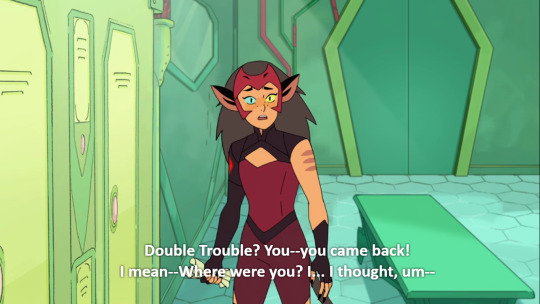
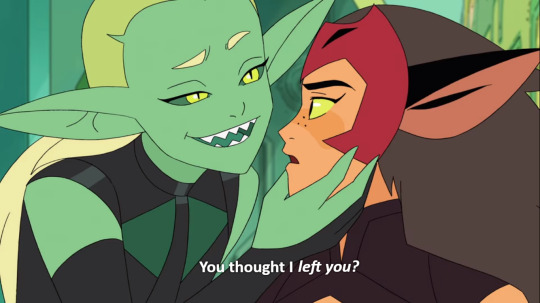
This scene gives me fucking chills with the nightmare-ish music and everything.. It’s like, at this point DT is just fucking with her, they’ve already got Catra figured out. This face touch is so cruel and fits with the show’s motif of manipulative affection, too. For me it felt very disconcerting to see Catra like this... unaware that she’s been defeated yet she’s so emotionally vulnerable here, she’s like putty in Double Trouble’s hands. Scorpia leaving cracked her open and, as they’re the last person left standing with Catra’s trust, Double Trouble’s in the perfect position to come in and break her.
So the next episode 4x13 has that crazy scene where Double Trouble totally obliterates Catra and I’m not even gonna talk about it lmao because yall have already done a great job analyzing it. But I do wanna draw attention to the fact that this is the only thing she says in this whole scene:
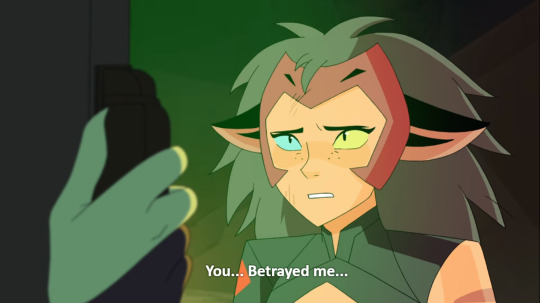
Can you believe that’s what mattered the most to her in that moment? Not that literally everything she had been working for for the past 4 seasons had just turned to dust before her eyes, but the fact that this random mercenary she hired betrayed her. And there was no anger at all, just... heartbreak.
And then look at what she says to Glimmer afterwards (setting aside the fact that Catra is basically giving up on life...) she says nothing about the war, nothing about winning or revenge. The only thing she’s thinking about is how lonely she feels.
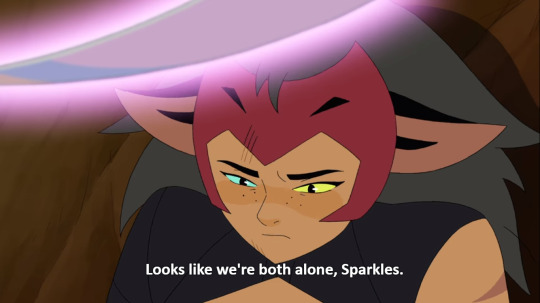
So by the end of Season 4, I think Catra did finally figure out what she truly wanted in life. She didn’t want to be on top just for power’s sake, she wanted people to respect her, to love her, so that no one could hurt her anymore. But she was so obsessed with winning that she ended up losing everyone’s respect. Wow haha if only she could get a second chance to earn it back the right way.... like say if, idk, she was trapped in space jail and forced to team up with her sworn enemy to survive and they came out best friends or something <:)
To sum up, Double Trouble’s role in Season 4 was to break Catra’s mask and force her to consider what she truly wants. I think their betrayal taught Catra to really appreciate what a terrible mistake she made in pushing Scorpia and Adora away. It taught her the difference between someone leaving her because they don’t care about her, and someone cutting ties with her even though they do care for her very deeply, they just couldn’t take Catra treating them like crap anymore. It showed her that what Adora did was nothing like what DT did. That’s what a betrayal feels like when the person doesn’t care about you. Someone who doesn’t care about you isn’t going to beg for your forgiveness for 3 seasons and risk being obliterated from existence just to get you back.
But the real beauty of season 4 was how Catra hitting rock bottom had almost nothing to do with Adora. With the help of other friends Catra has begun to find her own reasons to change, she’s acknowledging her guilt and heartbreak and discovering the person she wants to become. She’s learning to take responsibility instead of just blaming other people. And this character development had nothing to do with romance, just like how Adora breaking free of her destiny and learning to let go of control had little to do with Catra. I love the different perspectives on love that they give us with Catra, Adora, and Scorpia. I love how this show takes the “love conquers all” trope and subverts it, saying that sometimes.. love breaks you. Sometimes it’s not enough. Sometimes it’s used as a weapon. Sometimes you have to let go of people you love, but it opens up space for you to figure out who you are and what you want and to conquer your own demons. You’ll come out the other side with a better understanding of what real, healthy love is supposed to look like. And maybe in the end, the love you always sought will find you again, in its own time, in its own way. 💘
#OK THIS IS... A LOT. EVEN FOR ME LMAO#she ra#meta#season 4 is my fave so far i just had a lot of feelings to work through ok#would love to hear what yall think xoxo happy new year's!!
481 notes
·
View notes
Note
In talks abt c//a, some shippers touch on how the show's theme is "everyone is redeemable". How about no? Is it such a hot take to say a char is not redeemable after she's badly hurt the people around her, done heinous deeds like trying to end the world, and also not take responsibility for her actions etc? Is it a hot take bcuz she's been badly abused since childhood, distorting her emotions and morals? But can no lines be drawn at all? And y don't we look for a better rep for an abuse victim?
It’s a very interesting thing in that regard, yeah. I’ve come to the conclusion that, well She-Ra as a whole was never made to tell... an complex story, or a compelling universe, nor was it ever going to challenge it’s viewers.
I think, She-Ra was made as a hyper-personal story, with a very clear focus on being comfort media. As I’ve said before, although it tackles many different characters going through pain, lashing out, growth, etc. It tries it’s best to never allow anyone to actually face... damning consecuences, no matter how terrible the choice or the action.
I personally believe, yanno, this show WAS made for your average Catra... that is to say, people who relate to maybe having gone through abuse, potentially became abusers themselves, and have perhaps worked on getting better and seeking forgiveness and love back.
I’m not too sure WHY the show centered itself so MUCH on Catra being... just very cruel to people around her, specially with people who ACTUALLY cared for her, and never allowed her to ADRESS herself and seek PERSONAL growth, however this narrative of... coddling and forgiveness through ROMANTIC LOVE, “I’ve always loved you! Please stay”... I mean it’s comfortable, it’s pretty shallow, romantic in a way, to anyone who’d like to be coddled and stuck to Catra, that is.
Crew-Ra deffinately subscribes to this ideal, wherein, your redemption and your healing can ONLY come, truly, from someone who will love you, accept you and coddle you “Despite your flaws”.
I deffinately UNDERSTAND when people speak so fondly of it, I mean, it SEEMS super nice and ideal, but PERSONALLY I think it’s too naive and irresponsable when it disregards the... reactionary emotions of characters who were hurt BY Catra? But, AGAIN, it was never ABOUT them.
I don’t feel as though judging Catra’s story or character in a manner in which, one thinks she’s become irredemable is wrong, or should be shunned, that’s just what happens when one judges media. I feel terribly sorry for anyone who was lured in by all the flags and accolades this show and it’s story gets, and found a comfort piece that has such a flimsy message to say and felt disregarded.
It is my SINCERE hope, that She-Ra will become... a steping stone for better stories to come were perhaps abuse, and the cycle of abuse can actually be deeply and critically explored. Yanno, outside the OBVIOUS milestones in representation (Which are also face value at best, when the entire writing crew is white, able bodied, blah blah blah), but yeah, here’s hoping.
There’s also a discussion to be had around... why late teens and young adults on online platforms, like twitter, SHOULDN’T influence the production of CHILDREN’S animated media? sjkegbksejbg, as in, so glad ya’ll had fun with shipping, and uh THE MESSYNESS OF THIS ROMANCE, OH BOY? Has anyone actually seen a Y7 child actually enjoy this show? I personally haven’t had the chance, I mean I hope so, it was marketed FOR THEM jhsebnrgjk.
So uh, I think, we should advocate for better stories, made for their RESPECTIVE audiences, with more diverce voices MAKING them, from the get go. Yeah.
34 notes
·
View notes
Text
Continued thoughts about Catra and Hordak...
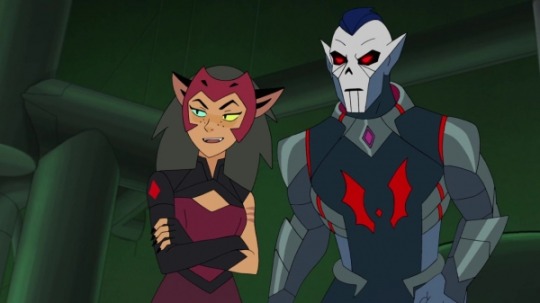
Hello again, y’all! Is life still treating you okay? Have you spent time with your pet lately? Eating a healthy and balanced diet? Just a smaller thing today, not one of my full-blown book reports, but the infection that is she-ra passion has somehow managed to reach me even through the haze of pokemon breeding that has owned my soul this past week, and I gotta words some more. The topic of discussion today will be Catra and Hordak… namely, how I interpret their dynamic going through season 4, and why some people view it as romantic. I’m… a bit of a windbag, though! So, just to be safe, I’m gonna put the rest of this post behind a cut. Let it never be said I was aught but a considerate dude. Let’s discuss!
Now, as I mentioned earlier, I don’t view the dynamic between Catra and Hordak as romantic in season 4. I think the reason it can kind of seem that way is that season 4 really did shift their relationship in a fairly dynamic way, and the contrast between the way they interacted before and the way they interacted after is pretty stark. Normally, such a wide contrast is brought about by the development of romantic interest by one or both parties, but in this case I posit that the cause was something equally interesting... though quite a bit more tame: it was the first time there was any sort of emotional interaction between them, at all.
I should probably step back though! Lemme explain what I mean. How would you describe Catra’s relationships with Hordak and Shadow Weaver across the first three seasons of the show? One of the more interesting takes I’ve heard is that the dynamic between the three of them is an allusion to a dysfunctional family. Catra is the child acting out because she wants Mom and Dad to acknowledge her. Shadow Weaver is the caustic maternal figure, emotionally sabotaging her child for her own benefit, and Hordak is the aloof, emotionally detached father figure… The kind of Dad who can’t come to your basketball game this week, kiddo, because work called… but he’ll be there next week for sure!
...unless work calls again next week… and work always calls again.
I agree with about half of this. The fact that Shadow Weaver is meant to be seen as an allusion to a poisonous maternal relationship feels pretty close to undeniable. Likewise, any doubt that Catra sought to be valued emotionally by her flew out the window when we saw the way Shadow Weaver treated her in the illusory reality created by the portal.
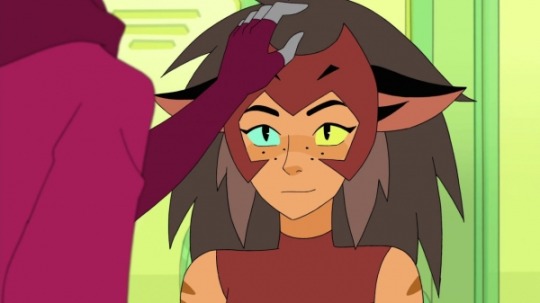
Pictured... kitty getting scritches.
Catra wanted to be appreciated, accepted, and loved by Shadow Weaver, and the tragedy of her character comes from being denied those things. By contrast, when it comes to Hordak, of those three desires: appreciation, acceptance, and love… she only really wants two of them.
There is no personal element to the early relationship between Catra and Hordak, on either side. Catra neither seeks fatherly love from Hordak, nor seems to be distressed by the lack of it, and that difference in her dynamic with Shadow Weaver and Hordak is pretty important.
Catra desires maternal love from Shadow Weaver. What she desires from Hordak isn’t paternal love, but rather patriarchal validation. Hordak represents the power structure of the world into which Catra was born, and her desire is to be seen as a component of that structure that has value.
For three seasons, where Hordak is concerned, her first priority is to be seen as an undeniably competent subordinate. She endeavors to complete the tasks she’s given efficiently, and attempts to make suggestions with the intent of increasing the effectiveness of the organization. She fails in gaining his appreciation, and grows annoyed and frustrated by this, but that shallow anger she expresses toward him pales in comparison to the absolute devastation that Shadow Weaver’s ever-more-personal rejections bring her. Had the status quo remained where it was, the two of them likely would never have grown any closer to one another… but then season 4 happened.
So, last week I shamelessly stole a question aimed @cruelfeline , and in my tactless theft I mentioned my answer to the question “why didn’t Catra just kill Hordak when she had him at her mercy in episode one”. I’m going to repeat that here, just to make sure it’s established:
“Some people don’t get why she spared Hordak instead of killing him, when she had him at her mercy, but she actually had a pretty vital need for him. Catra has lost the ability to self validate: a lifetime of being raised by Shadow Weaver has beaten it out of her. Thus, she has a pretty intense desire to receive external validation from an outside force… and with Shadow Weaver gone, Hordak was the only person around who could provide that.”
And let’s be clear on this first and foremost: the S4 relationship between Catra and Hordak is, for both parties, an attempt at rebound. This is the first time Catra has Shadow Weaver fully cut from her life, leaving her with only Hordak to supply her with parental appreciation, and Hordak has been betrayed by someone he cared for deeply, but receives motivation to destructively channel his negative emotions from Catra.
This is also the first time Catra interacts with the real Hordak, and not the mask he usually wears before his subordinates. While being exposed to his vulnerability gave her the power to usurp him, it also led her to a realization: Hordak is… a lot like her. One of my other favorite moments of wordless acting takes place with Catra in season 4. Hordak is expressing his feelings of inadequacy and desire to be acknowledged by his brother while destroying them princesses, and Catra, despite saying nothing, displays a range of expressions and ear movements that seem to say ‘wait a minute… is this guy… actually my dad, after all?’
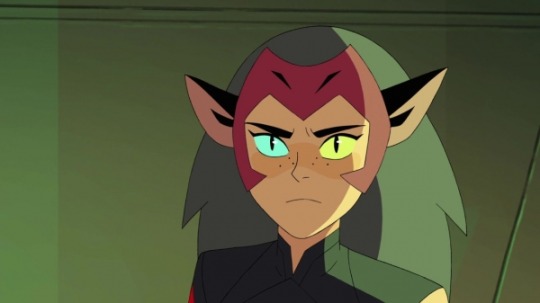
That realization of commonality leads to the first actual emotional interactions between the pair. The first actual attempt to understand each other, and that is, undeniably, a massive shift from the cold professionalism of their previous relationship. Catra was always quick to assure Hordak that their actions were leading them down the path to his brother’s acknowledgment, and Hordak, in turn, validated Catra’s actions and choices… which she especially needed to hear in season 4, when she pushed literally everyone else out of her life. Unfortunately, as I mentioned, their relationship was mutually self destructive… each brought out the worst from the other, and helped their downward spiral remain in motion. It’s interesting how there is a bit of similarity to the dynamic between Hordak and Entrapta and the one between he and Catra. Both are examples of awkward, lonely people, realizing they share more in common than they realized, and growing closer as a result. The latter is more parental than romantic, but the similarity is intentional, all the same… a way of contrasting healthy and unhealthy relationships, if I had to guess.
So… yeah! If you’re wondering what the point of all that was… well… I’m flattered you think highly enough of me to assume I ever have a point to saying anything! I was just pondering she-ra while biking across Galar, waiting for my rookidees to hatch...as you do… and decided I wanted to talk about it some more! As always, I’m not really out here to persecute the Catdak shippers… er… all five of you. I will never be the guy to judge people who ship things I personally don’t like, because I’m not a mailbox head. Just expressing why I don’t think it’s romantically coded, but also why I still find it fascinating regardless. That’s enough outta me, though! You guys have a lovely and productive week. If you have any she-ra related thingamajigs you, for whatever reason, wish to hear my thoughts about, feel free to ask, and I’ll see ya the next time I have the urge to feel ways about stuff. Been procrastinating on my fanfic writing… so I think my next order of business will be to get that ball rolling again. Anyhow, see ya! Be sure to indulge in the finest of all winter beverages: warm, spiced eggnog.
48 notes
·
View notes
Note
when i use the phrase “atonement arc” i’m not talking about zuko. his villain-to-hero arc is absolutely redemptive in nature, and while i think it is a particularly well-written one it is also, like all redemption arcs, focused on the redemptive power of suffering and forgiveness, which is the thing i don’t like about redemption arcs.
zuko suffers because of his misdeeds. his earnest effort to earn his father’s approval leads to him being violently cast out and forced to live as a fugitive from both the fire nation and the earth kingdom. his true identity is despised by everyone he comes into contact with, save for iroh, and he endures deprivation, humiliation, poverty, and rejection, and it is this suffering that puts him on the path to recognize his own wrongdoing. when he attempts to reject this recognition by betraying his uncle and returning to the fire nation with azula, the redemptive power of his previous suffering manifests as him being tormented by his own conscience and the apparent rejection of his father figure. when this becomes too much for him, he leaves and does attempt to atone for what he’s done [to the main cast, and to iroh; things like him razing kyoshi island to the ground & similar incidents are ignored]. but the capstone of this arc is forgiveness - there are entire episodes dedicated to zuko earning forgiveness from the people he hurt most deeply, and the pinnacle of his entire character arc is iroh forgiving him.
when people hold up zuko’s arc as an example of a redemption arc done right, they talk about how he struggled. how he failed. how he felt pain and agonizing internal conflict. and they’ll talk about how he was relatable and sympathetic before his redemption arc began, and how that made his eventual redemption more palatable to fans. they talk about how prior to his redemption, he didn’t cross any lines that would have made him unforgivable. they might talk about his efforts to atone in the context of justifying the other characters’ forgiveness of him, but like... that’s not the part of his arc that people talk about when they talk about why his redemption arc succeeded.
and when zuko’s atonement does come up in redemption arc discourse it is almost always in the context of comparing a different character’s villain-to-hero arc negatively to his. i think the best example of this phenomenon is the discourse surrounding catra’s arc, because people LOVE to say that catra’s “redemption” is bad and the reason given for this is that she... isn’t held accountable and doesn’t atone for her actions, unlike zuko.
except how she...does. she does! she recognizes that she was wrong and saves glimmer at the cost of her own safety, fully intending to sacrifice her own life to protect her former enemies. she apologizes to people she hurt and makes a concerted effort to do better. she joins the resistance and plays an integral role in defeating the horde. this is completely on par with the things zuko did in order to atone, so what do people actually mean when they say he redeemed himself but catra didn’t?
press it hard enough and they’ll admit that they mean that she wasn’t punished, that there weren’t any episodes about her “earning” forgiveness or even seeking it at all, there weren’t any drawn out emotional scenes where she tearfully laid out everything she’d done wrong to adora or to the resistance in general and wallowed in guilt until someone made a gesture of forgiveness. she suffered, and the show explicitly pointed out that much of that suffering was self-inflicted, but unlike zuko, her suffering is not framed as redemptive. catra is fully aware that she’s doing evil things right from the beginning, and she does it because she’s angry, because it makes her feel powerful, because she’s lashing out at people who harmed her. when she changes, it isn’t because her suffering led her to realize that she was on the wrong side - she knew that already. she just. decides that she wants to do the right thing for once. and people hate that, because that’s not how redemption arcs are supposed to go (because it isn’t a redemption arc, but every villain-to-hero arc gets judged by the standards of the redemption arc).
to loop this back around to tts - most folks who hate cassandra’s villain arc specifically cite the lack of punishment as the reason they hate it. cassandra expressing regret and trying to atone by aiding the fight against zhan tiri isn’t enough for her to “deserve” redemption. i cannot even count the number of times i have seen people say with complete seriousness that varian’s redemption arc worked because he went to prison and suffered consequences and cassandra’s didn’t because she was allowed to just leave corona after the fighting was done. people, largely, don’t talk about how varian tried to fix fred and arianna’s memories or repurpose the amber for corona’s benefit or how he was willing to put his own life at risk to save corona from being blown up when they’re comparing his redemption to cassandra’s - they talk about how he faced consequences like jail time and she got off scot free. or they’re furious because cassandra didn’t “earn” rapunzel’s forgiveness.
and that’s the core reason i draw this distinction between redemption arcs and other kinds of villain-to-hero arc, because when people talk about redemption arcs they focus on the punishment, the consequences, and whether a character “deserved” redemption or forgiveness, and redemption arcs themselves are constructed around redemptive suffering and redemptive sacrifice and forgiveness. this is why redemption-by-death is such a widespread trope, why people become so INCENSED when a character doesn’t suffer enough to “make up for” the bad things they did, why the discourse surrounding redemption arcs is so intently focused on the question of whether a character “earned” or “deserved” it, why we talk about a character being redeemed vs a character atoning.
TLDR:
atonement is an action that does not require forgiveness.
redemption is given, or “earned” through suffering.
a character atones. a character is redeemed. atonement is about the character who did wrong; redemption is about the characters who were wronged.
think of it this way: you can ask whether a character “deserved” to be redeemed. do they deserve to be thought of as a hero? did they earn the trust and acceptance of the heroes?
but you can’t ask whether a character “deserved” to attempt atonement. do they deserve to try to fix what they did wrong? did they earn the right to apologize and offer reparations or work to better themselves as a person? those are nonsense questions! you don’t “earn” trying to be better, you just do it!
& that’s where the distinction lies.
Let Cass and Zhan Tiri go berserk without needing a redemption arc ✊Destroy the world my babies
gkjsdhg well yes but also
ok so. not to get too religious trauma™ on main but the reason i hate redemption arcs isn't that i have anything against the broader category of villain-to-hero arcs, it's that i have a specific ethical problem with the concept of "redemption" in and of itself
& a redemption arc is a specific type of villain-to-hero arc defined by the following beats:
1. character does evil 2. character realizes they did evil, either: a. because their actions harmed someone they love, or b. they themselves endure punishment or great suffering 3. character expresses shame/regret/horror a. (optional) character tries to make things right. b. (optional) character commits to being better. c. (optional) character actually becomes better. 4. character is forgiven and welcomed onto the side of good a. (optional) ...posthumously, because they sacrificed themself.
like. cassandra is a perfect example, really. the narrative constructs her s3 arc thusly: she sins by 'stealing' the moonstone and attempting to violently usurp rapunzel's rightful destiny, following which she is led further astray and abused and ground into the dirt by a literal demon. here, at her lowest point, she sees her own wickedness clearly and falls into an almost catatonic state of guilt and self-disgust—until she repents and rapunzel forgives her, restoring her to her former self. she even gets a sacrificial death to really drive the point home, although rapunzel resurrects her afterwards.
there's nothing wrong with her redemption arc, on its technical merits. i mean, it skips 3a, 3b, and 3c, but so do most redemption arcs, because those steps are not required for a redemption arc, because redemption arcs are about suffering and sacrifice followed by forgiveness.
and then of course every time a redemption arc happens you get folks crawling out of the woodwork to scream that whatever character didn't DESERVE redemption because they weren't SUFFICIENTLY PUNISHED to EARN FORGIVENESS and yada yada, sometimes they'll dress it up as fretting that the character didn't do enough to atone for what they did, but nine times out of ten if you really press it it'll become pretty obvious that "atonement" to them means "accepting punishment and/or self-flagellating," which actually has nothing to do with atonement whatsoever.
so when it comes to villain-to-hero arcs, i am interested in atonement arcs i'm interested in arcs about healing and doing better and fixing what was broken. i don't care about suffering or punishment or sacrifice or forgiveness; i don't care if a character "deserves" forgiveness or not or whatever i literally like. cannot express how much i loathe redemption arcs and the incredibly counterproductive and toxic mindset they promote towards self-improvement or healing.
#long post#there's a whole other discussion to be had about how#'forgiveness' isn't something that can or should be 'earned'#and the way redemption arcs center forgiveness as like#the ultimate symbol of whether a villain is now 'good'#is extremely fucked up in and of itself#anyways.
60 notes
·
View notes